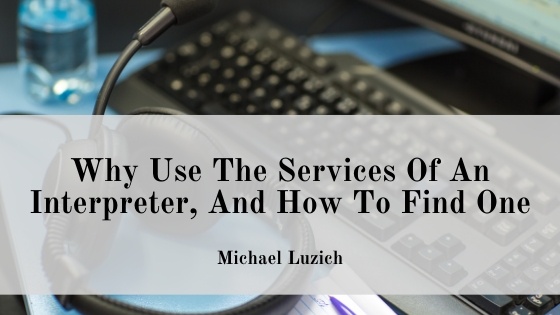When you expand your company into an international market, the first issue you’ll encounter is likely a language difference. Resist the temptation to choose anyone who is “only” fluent in the target language to act as your interpreter—hire someone who is knowledgeable about business and can communicate in the vernacular of your industry. A good interpreter evidences your professionalism, reinforces your company branding, and facilitates meeting productivity.
Professionalism
Professional interpreters come prepared to learn about your company and its place in your industry. In fact, some specialize in particular industry sectors. The best strategy is to sit down before a client meeting and rehearse your pitch with them. Show them your slide deck and brief them on the meeting participants and your goals.
An interpreter translates your words wholly and directly, without summarizing or condensing. Even if the proceedings become heated, your interpreter is trained to remain objective.
Branding
Your interpreter is your voice—functionally, a part of your brand. They translate the meaning of your words to project your confidence, presence and trustworthiness—your personal brand—to your negotiating partner.
They also help to define your brand. Hiring an interpreter shows respect for your partner. Many of your customers and business partners may be able to communicate in English. However, they are still more comfortable in their native language. You’re demonstrating that you are prepared to meet your partner professionally, in their own language and, it gets noticed.
Confidence
Your interpreter frees you from worries about misunderstandings, including cultural missteps, taboos, and missed nuances. For example, in Japan, flatly refusing an offer or request is seen as rude. As a result, a Japanese businessperson may say “tabun” (“maybe”) when they mean “no.” An interpreter can help you understand what your potential partners mean, not just what they say, and help them know you in return.
The confidence this gives you is hard to overstate. You can focus on expressing yourself in your own way, knowing that the interpreter will convey your words accurately and pursuant to your intent
Why you should consider hiring your own interpreter
Developing a working business relationship with your interpreter enables them to understand you and your company better. Because of this, your own interpreter is better able to represent you to others. When you take the time to build a good working relationship with your interpreter, trust develops. Trust helps ensure that everything that your interpreter sees or hears is held in strictest confidence.
Finding a good interpreter for your needs
So, how do you go about it? A good search engine will provide a choice of agencies and independent interpreters. Remember that this industry makes a distinction between “interpreters,” who work with the spoken word, and “translators,” who work with written words.
Interpreters are consultants, just like your accountant or your attorney. You evaluate them using many of the same criteria that you use in hiring other outside professionals.
- Can they speak intelligently (in general terms) about your industry?
- Do they speak with native fluency? Are they able to help you understand cultural nuances in play?
- Check their references, even when they are recommended to you by someone you know.
- Talk with each candidate. Is their presentation professional? How is their emotional intelligence? Are you comfortable with this person representing you and your brand?
- Do they charge by the hour? By the day? What is their policy about overtime? If your plans change, what is their policy for cancellation or rescheduling?
The relationship with your translator develops over time, so you want to work with the same person long-term if you can. The business relationships an interpreter can help you build go a long way toward ensuring your company’s success in the global marketplace.

